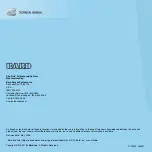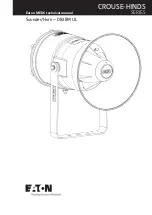
Specifications
Fluid Compatibility:
LNG, Methane and LN2
Maximum Refueling Pressure:
500 PSIG / 34.5 BAR
Maximum System Pressure:
500 PSIG / 34.5 BAR
Burst Pressure:
> 1,500 PSIG (103.5 BAR)
Rated Flow:
50 GPM @ 250 PSIG (LNG)
Nozzle Weight:
10.4 LBS
Port Size:
1” Male SAE 37° Flare (SAE J514)
(1-5/16 -12 Thread)
Operating Temperature:
-320°F to +140°F
(-195°C to 60°C)
Meets ISO 12617 requirements.
For Use with Macro Technologies receptacle part numbers 13530,
13615, 13620, 13705, 13990 and 14050.
Additionally, the nozzle has been verified to function well with other
manufacturer’s receptacles such as JC Carter receptacle part
number 62050 and Parker (Hannifin) Kodiak series receptacles.
We cannot guarantee that these or any other manufacturers will
continue to make compatible products.
Macro Technologies fully supports the development of National
and International Standards. We are active in participating in the
development of these standards.
Key Features
Thank you for purchasing the Macro Technologies CryoMac
®
3 LNG
(Liquid Natural Gas) Fueling Nozzle (Part No. CryoMac3-50M and
CryoMac3-50M-S). We know that you will find it safe, easy to use
and easy to service. Our Patent Pending design solves many of the
issues that have plagued competitive LNG Fueling Nozzles.
Macro Technologies offers the highest quality product with new–
age technologies to improve safety and ease of use including:
A positive “Vent Position” to release gases trapped
between the nozzle and receptacle through the Vent
Holes, which improves safety hen removing the Nozzle.
Ball bearings to lock the Nozzle in place during fueling.
Balls bearings help to guide the nozzle and let it “roll”
on and off easily. Light weight design makes the Nozzle
easier to handle over long work days and easier to slide
onto the receptacle.
Non-metallic bearings, air gaps, and insulation at key
points are used to minimize ice issues. Easy access or
maintenance of the receptacle end seal, poppet assembly
and the poppet seat. No expensive “clamp dogs” to
replace.
Reasonable cost while maintaining reliability.
Automatic Shutoff when disconnecting.
2
































